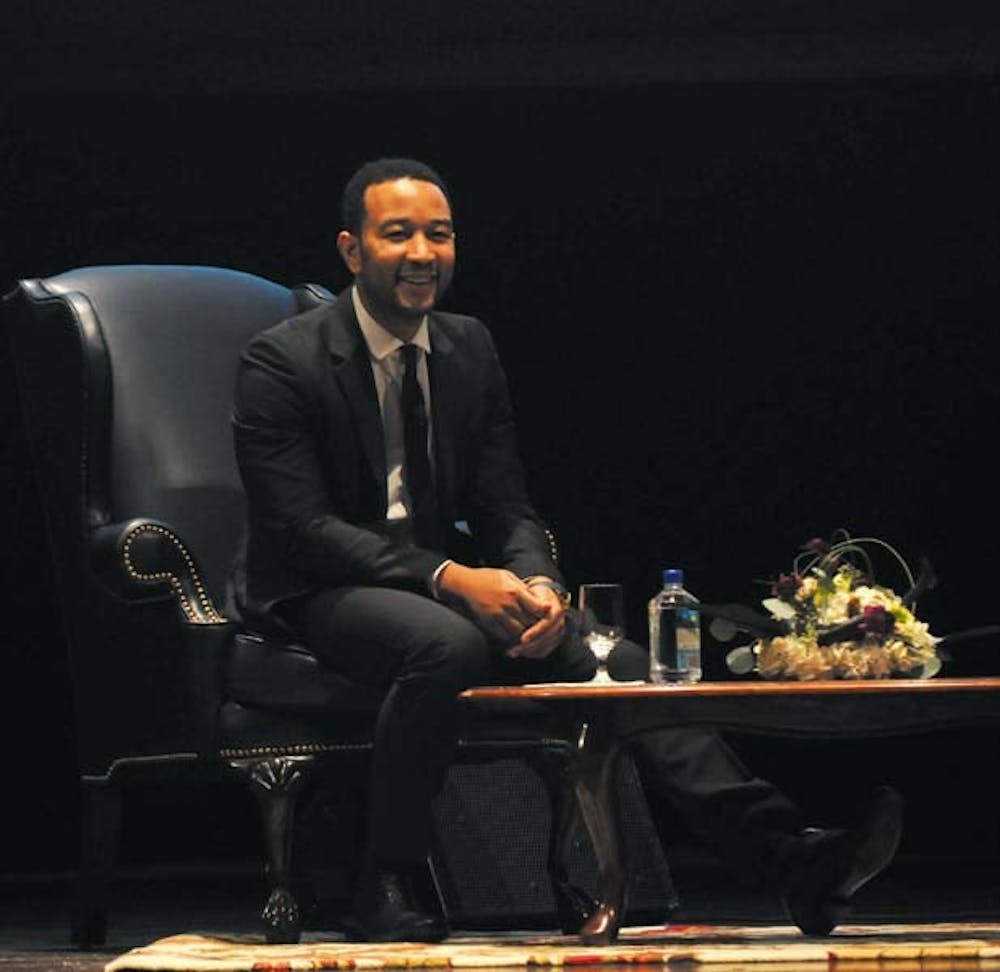
In a small backstage room at Irvine Auditorium, 1999 College graduate John Legend sat down without hesitation, happy to meet a group of reporters before the evening’s events. Though he was about to face a packed house, he spoke smoothly, almost as if he were humming one of his songs.
Last night, Legend joined Camille Charles, director of the Center for Africana Studies, to deliver the 12th Annual Dr. Martin Luther King Jr. Lecture in Social Justice. The event was part of an annual symposium, sponsored by the Center for Africana Studies, to honor black Americans dedicated to positive social change.
Legend’s calm tone in front of the reporters made him sound like any other Penn graduate. “I remember putting our sandwich board up and selling tickets for [student a capella group] Counterpart shows and then rushing off to class,” he said smiling.
Even with such an amicable presence, though, it’s hard to forget how grand his accomplishments have been.
Legend is a nine-time Grammy award-winning recording artist, philanthropist and social activist, named one of Time magazine’s 100 Most Influential People of 2009. He sits on the boards of the Education Equality Project, Teach for America and the Harlem Village Academics, and has received many awards for his humanitarian work.
Last night, back at his alma mater, he received another.
Before his lecture, Legend was invited to a small reception with some old friends, current Penn students and Philadelphia government officials.
At the reception, City Councilman Kenyatta Johnson personally thanked Legend for his humanitarian efforts. “I want to thank you for your work to make sure all young people have a quality education. It is truly the civil rights issue of this day,” he said.
Afterwards, Johnson held up a certificate of recognition for Legend’s philanthropic work.
He still appeared relaxed as he shook hands with Johnson and posed for pictures. Perhaps his relationship with President Obama — he performed at last year’s White House State Dinner — made even this recognition more like an ordinary day.
Before long, guests at the reception started funneling into Irvine for the lecture. However, Penn President Amy Gutmann first reminded all the star-struck fans and struggling artists of the particular significance of this year’s symposium.
This is the inaugural year of Penn’s Department of Africana Studies, devoted to the study of the historical and contemporary experiences of Africans and peoples of the African diaspora. In addition, 2013 marks the 50th anniversary of the historic March on Washington.
When it came time for the main event, Legend entered the stage with familiarity. As Charles asked him questions, he kept the audience engaged, telling jokes and asking questions of his own.
But he was more than an entertainer. He spent much of his lecture sharing his philanthropic, humanitarian and political viewpoints with a hushed crowd.
Legend spoke of Penn in particular as a major inspiration for his career — first as a musician and then as an activist.
“No one says, ‘Go to Penn so you can break into the music business,’” he said. “But it just so happened that being in Philadelphia, being surrounded by other brilliant people at Penn — it actually was very helpful in becoming a recording artist.”
Though “hit singer” may seem like a high aspiration, Legend set greater goals for himself even at a young age. By 14, Legend knew that he wanted to develop a musical career that could also make a difference in the community and the world.
He said, “I always had a sense that if you’re living a life that means anything, you’re fighting for social justice.”
Legend has performed much of his philanthropic work to improve access to education.
“A lot of [educational inequality] has roots in slavery, in segregation,” he said. “We’ve said certain communities weren’t deserving of the full resources of our society. We’ve accepted that certain people weren’t destined for greatness.”
Legend’s frankness resonated powerfully with the audience. Many were nodding in agreement, and others shouted out words of approval as he spoke.
College sophomore Alexandra Roman said she “didn’t know how passionate he was” about social reform.
College freshman Erica Nicokiris added, “It really resonated with me coming from a similar background.”
As the event came to a close and Legend took a final question from the audience, he predicted a new age of socially minded music.
“I feel like there’s a little turn-around coming, and it’s already begun.”
The Daily Pennsylvanian is an independent, student-run newspaper. Please consider making a donation to support the coverage that shapes the University. Your generosity ensures a future of strong journalism at Penn.
DonatePlease note All comments are eligible for publication in The Daily Pennsylvanian.





